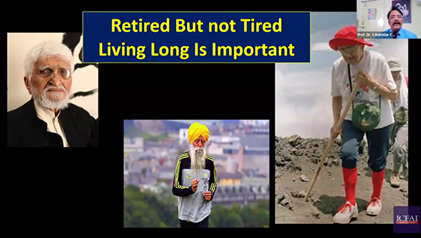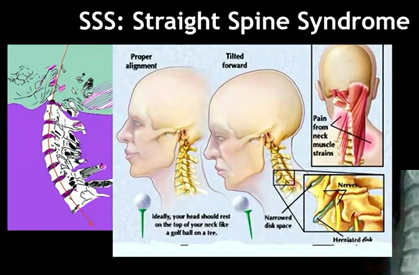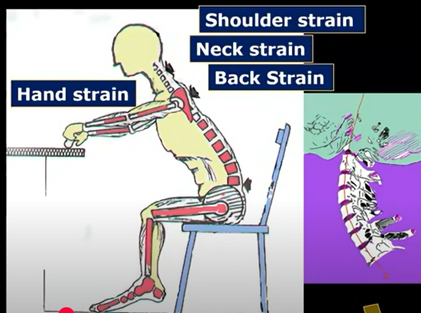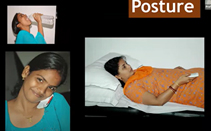An evening with Dr S Bakhtiar Choudhary (Retd)
Introduction
On May 2, 2025, we had an engaging session by Dr S Bakhtiar Choudhary (Retd), a war-veteran (IPKF) and well-known Sports Medicine specialist in the country. Dr Choudhary has served the Indian Army and Apollo Hospitals with distinction for a decade each. Currently, he is the Director of Hyderabad Spine Clinics, Hyderabad Sports Medicine Education and Research Foundation. Dr Choudhary is a visiting faculty to many premier institutions which train IPS, IAS & IRS officers and many reputed Universities. Dr Choudhary has also delivered a TED talk on ‘Discovery of causes of Spine Diseases.’
About Prof Dr S Bakhtiar Choudhary (Retd)
Dr Choudhary has represented many National & International sports teams (Cricket, Boxing, Rowing, Athletics, and Hockey) as a sports medicine team doctor. He has treated many world-class cricket players like Mike Gatting, Adam Gilchrist, VVS Laxman, political leaders like Sri Chandrababu Naidu, and film stars like Balakrishna, Venkatesh, Rajendra Prasad, and Anil Kapoor.
Dr Choudhary has contributed more than 1000 articles in dailies and magazines. He is a popular expert on most television channels (including Discovery Channel) on healthcare issues. Dr Choudhary has made 700 plus YouTube films freely available to the public. He has developed and participated in 600 TV programs. He has many blogs and podcasts to his credit.
Dr. Choudhary has contributed original research on medical problems related to IT professionals, the fitness of school children, housewives, and environmental studies. He has discovered many new diseases related to occupational health and developed new methods for sports, training and injury assessment, management, and rehabilitation. Dr. Choudhary is considered an authority in workplace ergonomics, E-waste management, Fitness training, and Fitness Nutrition.
Dr. Choudhary is the President of the Indian Federation of Sports Medicine (AP), former President of the Indian Association of Occupational Health (AP &TS)) and Vice president of the Life Saving Society of India. He was awarded the prestigious “Sir Ardeshar Lal Dalal Oration Award, Dr. CKR Oration Award, and IAOH Mumbai Oration Award for his research in Occupational Health.
Dr Choudhary has been conferred the Hall of Fame award for his multifaceted personality. He holds a Guinness Book nomination for adventure sports and a black belt in karate. Dr Choudhary is a reputed painter, photographer, dancer, horticulturist, animal lover, wildlife conservator and educationist. He has published two coffee table books on birds.
On the importance of fitness
Only if we are healthy and fit, will we be able to enjoy a long and productive life.
Consider Olga Cruz, who took up mountaineering late in life (in her late 50s). She climbed 26 peaks all over the world. At the age of 94, she was still climbing. Her good cholesterol- level was an unbelievable 64.
MF Hussain, the famous painter, was fit even in his 80s. He could stand bare foot for hours together and paint.

Consider the oldest Sikh marathon runner Sardar Fauja Singh, a British Sikh of Indian origin. He completed his first marathon at 89 and continued running into his 100s, becoming a symbol of inspiration.
How are these people so fit when much younger people are unfit? All these inspiring personalities may be retired but they are not tired. What we can learn from them is that we must have good health to thrive in our second innings.
We should aspire to live long. It is wrong to say life is short. Life is not all that short. An average man is supposed to live for 100 years. Mental programming is key.
Unfortunately, right from a young age, we do not pay enough attention to physical fitness. In schools, academics takes priority, and physical activities take a back seat. So our school children lack fitness. And as we grow older, our sedentary work life complicates things further.
On the importance of ergonomics
In both the workplace and our schools, we should pay more attention to ergonomics. Many children do not have a proper table at home for attending online classes.
Dr Choudhary explained in detail, the straight spine syndrome, the result of a poor sitting posture.


In the figure above, the person is not tall enough for the feet to reach the ground. We should provide a footrest, not reduce the chair height. Our feet should be flat on the floor or the footrest. We must also provide a cushion to rest the back. Our elbow should be comfortably placed on the table. If we do all this, the spine’s curvature will be restored and the need for surgery can be avoided.
On obesity and waistline
There is a famous saying: The thinner the waistline, the longer the lifeline. That calls for nutrition, exercise, sleep, disease management and stress management.
Visceral obesity, also known as abdominal obesity or central obesity, is characterized by an excessive buildup of fat deep within the abdomen, specifically around the organs. Visceral fat is considered more dangerous than fat stored under the skin because it can contribute to various health problems, including heart disease, type 2 diabetes, and certain cancers.
Truncal obesity refers to excess fat in the trunk (including the abdomen). Both visceral and truncal obesity are linked to metabolic syndrome and cardiovascular risk. But visceral fat is generally considered more dangerous due to its hormonal activity and association with insulin resistance.
We should measure our waistline every day (before lunch). It should not increase. Waist (just under the lowest rib) / Hip (at the widest portion of buttock) must be less than 0.85 for women and 0.9 for men.
Obesity is the result of high energy intake, genetic and parental influence and low energy expenditure. But genetic and parental influences come only later in life.
On nutrition
Exercise alone cannot result in fitness. It cannot burn even an inch of fat. So, nutrition is important. We should eat our food on time. We should also not change our food habits suddenly (like veg to nonveg or nonveg to veg). Otherwise, our micronutrients balance gets disturbed. Vitamin deficiency is another problem.
We should eat good vegetables (especially seasonal, and leafy ones) and avoid outside food. We should prefer whole fruits to fruit juice. We should consume less oil. We should use more of steaming and baking and less of frying. We need not stop consuming simple sugars. They do not cause diabetes. They only aggravate the problem when we already have diabetes.
On improving longevity and quality of life
By the time we retire, we should look forward to 15-20 years of good healthy life. Both longevity and quality of life are important. We should have minimal disease. And if we have a disease, we should tightly control it. Dr Choudhary gave the example of some retired military officers living in Sainikpuri. Despite having diabetes, they maintain a 150-160 mg sugar level post lunch.
Useful tips
- We should have at least 7 hours of sleep every day.
- We should exercise for one hour every day.
- We should eat on time.
- We should have some good hobbies.
- We should have a good family life.
On sports training
Consider a person making a debut at a high-profile sporting event like the Olympics. That person would be exposed to the shock of a huge number of people watching. We should first reduce the importance of the event so that it appears non-stressful.
We should follow periodization. We must prepare a timetable and follow a clearly defined and monitored process. Process goals and outcome goals are strongly correlated.
On Yoga
Dr Choudhary was a direct student of yoga master, BKS Iyengar, who was a direct student of Krishnamachari.
Yoga is a culmination of Prana, Asana and Dhyana.
Prana is the trumpet of life. It is about breathing properly.
Asana is about maintaining a proper posture.
Dhyana is about maintaining focus. We should not be distracted.
Yoga is a philosophy that emphasizes correct posture, proper breathing and a calm and focused mind. Yoga covers the 3Bs: Body / Breath / Brain. We should be mindful of our body, breath and brain.
There are 82,000 asanas. So, it is not possible to master all of them. Moreover, yoga is not just about asanas. It is essentially a philosophy.
On sitting in the same position for a long time
The mind’s attention span is 33 min. After that, the mind starts losing control. Neuro muscular coordination is affected. The body’s attention span is 45 min. After 45 min, we must get up from our chair and walk at least 6 feet. This will improve blood circulation. We should take 2 deep breaths. (When we sit, we do not breathe fully.) We should do a reset each time we get up. We should maintain a perfect posture even at the end of the working day.
On the consequences of inactivity
Three months of inactivity can have serious consequences:
- Muscle protein loss of 8 grams per day.
- Bone loss of 1.54 grams per week. This can seriously impair our health. Building of bones happens during the early years. After that it is only repair.
- Decrease in plasma volume by 10-15% (This can lead to auto immune diseases).
- Weight gain.
Imagine the consequences if we remain inactive for years together.
On exercise
Aerobic exercises build lung capacity and improve heart functioning. They are low intensity exercises: walking, jogging, slow running, etc. But we need to supplement them with strength exercises like dumbbells. Rehabilitation exercises can restore fitness and prevent the need for surgery.
Slow and steady wins the race. We should slowly increase the rigor of our exercise regime. We can begin with a few minutes of exercise. We should not exercise for more than 90 min. Even 30-60 min of exercise in 3-4 stretches is enough. Any time is a good time. It is never too late to start a fitness regime.
On avoiding dangerous postures
Consider the following pictures: drinking water, talking on a mobile phone and watching television while lying on bed. These dangerous postures can seriously impair our health and wellbeing.

On self-examination
We should know yourselves through introspection and self examination. Are we exercising? Are we paying attention to ergonomics? Are we eating on time? What are we doing right? What are we doing wrong?
On managing stress
Imbalance between resources and demands leads to stress. It leads to a feeling that we are not in control. The key is to control anxiety. Anxiety leads to worry which in turn leads to depression, disease and premature death. Anxiety can be sensed and measured.
On the importance of discipline
Discipline is the key to fitness. For example, we must have breakfast before 8 am.
To inculcate discipline, we should always be on time. We must also not entertain people who are not on time.
We should link outcomes with activities. For example, if students attend classes, they can pass the exam. Peer pressure can also help.
